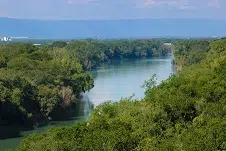The notion of potamology , which is not part of the dictionary prepared by the Royal Spanish Academy ( RAE ), refers to the scientific discipline dedicated to the study of rivers . It is a specialty that demands multidisciplinary work by bringing together issues related to hydrology , geology and other areas of knowledge.
Sedimentology, hydraulics or geotechnics are other disciplines that contribute to the development and success of potamology.
It is interesting that you know that this term that concerns us now has its etymological origin in Greek. Yes, because it has been given shape by uniting the following elements: the noun “potamos”, which can be translated as “river”; the word “logos”, which is synonymous with “treaty” and “word”, and the suffix “-ia”, which indicates “quality”.
 Potamology analyzes how rivers behave. In this way, by understanding how it works, you can provide useful data to prevent floods , for example.
Potamology analyzes how rivers behave. In this way, by understanding how it works, you can provide useful data to prevent floods , for example.
Other interesting data about potamology are the following:
-It is considered that the origin as such of this discipline is in the first half of the 20th century. Specifically, in 1927. At that time, serious floods occurred as a result of the Mississippi River, which led to serious human, economic and social damage. Hence, it was determined that it was necessary to thoroughly study the aforementioned river in order to prevent events like these from occurring again.
-The flow regimes of the river and exactly the variability of the flow of this water current become one of the main objects of study of potamology. And that leads to an in-depth analysis of factors such as evaporation, temperature, precipitation...
-Potamology has led to the determination of the existence of three fundamental types of river flow regimes: simple ones, which can be glacial, nival or pluvial; the complexes and the doubles. The latter can be of the nival-glacial, pluvial-nival or nival-pluvial class.
It is important to keep in mind that a river is a stream of water with a variable flow that flows continuously and empties into another river, a lake or the sea. Sedimentation and erosion phenomena occur in its bed.
To understand fluvial dynamics (related to how, as they flow, rivers modify their layout and land relief), potamology pays attention to numerous variables. Precipitation constitutes one of the most relevant factors that affect the characteristics of a river.
Thanks to potamology, it is possible to exploit a river as an economic resource through the construction of dams to obtain hydroelectric energy or through the development of locks that favor navigation and facilitate the transportation of goods, to mention just two possibilities.
Potamology is also relevant to the protection of ecology . This scientific area focused on rivers can provide information that contributes to the design and application of environmental conservation strategies. That is why their contributions are key in various sectors.
